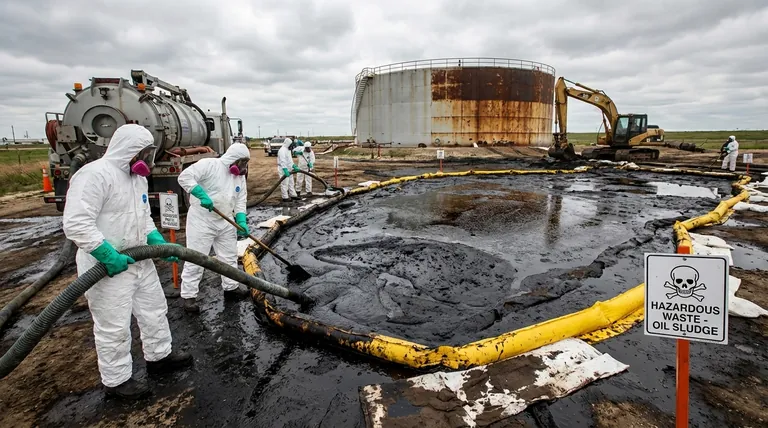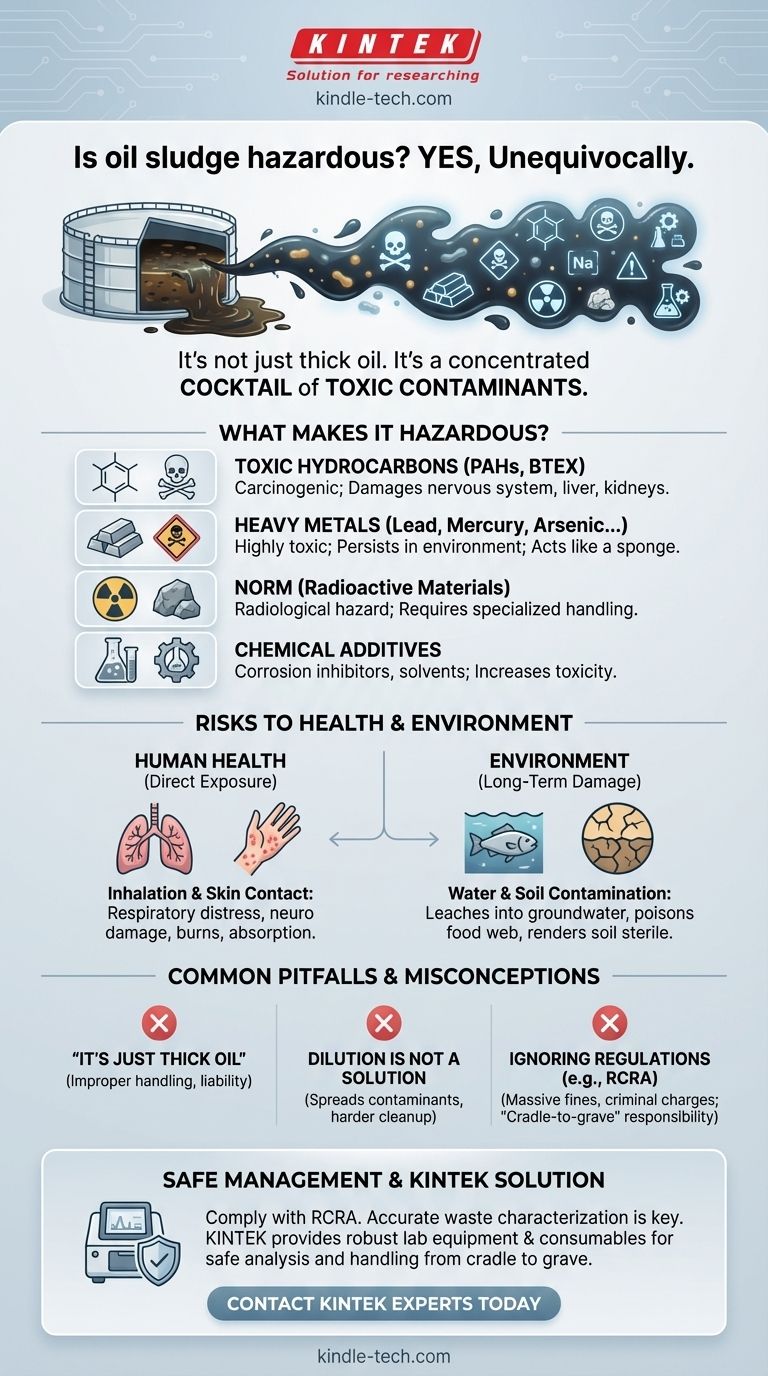Yes, oil sludge is unequivocally classified as hazardous waste. This is due to its complex and toxic composition, which goes far beyond simple crude or refined oil. It is a concentrated mixture of dangerous hydrocarbons, heavy metals, chemical additives, and sometimes even radioactive materials, posing significant risks to both human health and the environment.
The core reason oil sludge is hazardous is not the oil itself, but the toxic contaminants it collects and concentrates. Treating it as simple oil is a dangerous and costly misconception; it must be managed as a complex hazardous material from generation to disposal.

What Makes Oil sludge Hazardous?
Oil sludge is not a single substance but a complex, semi-solid emulsion. It forms in storage tanks, pipelines, and processing vessels as heavier components of oil settle and mix with water, solids, and various contaminants.
A Cocktail of Contaminants
Sludge is an aggregator of the most problematic elements from oil and industrial processes. Its composition can vary, but it almost always contains a potent mix of harmful substances.
The Role of Toxic Hydrocarbons
The oil component of sludge is rich in polycyclic aromatic hydrocarbons (PAHs) and BTEX (Benzene, Toluene, Ethylbenzene, Xylene). These compounds are known to be carcinogenic (cancer-causing) and can cause severe damage to the nervous system, liver, and kidneys.
Concentration of Heavy Metals
During extraction, transportation, and refining, oil comes into contact with various metals. Sludge acts like a sponge, concentrating heavy metals like lead, mercury, arsenic, cadmium, and chromium. These metals are highly toxic, even at low levels, and persist in the environment.
Naturally Occurring Radioactive Materials (NORM)
In the oil and gas industry, sludge can concentrate Naturally Occurring Radioactive Materials (NORM), such as radium and its decay products. This elevates the radioactive profile of the sludge, making it a radiological hazard that requires specialized handling.
Chemical Additives and Byproducts
Industrial processes use a wide array of chemicals, including corrosion inhibitors, solvents, and cleaning agents. These chemicals inevitably end up in the waste stream and become a component of the sludge, adding to its overall toxicity and chemical reactivity.
The Risks to Human Health and the Environment
The hazardous classification is a direct result of the severe risks sludge poses.
Direct Exposure Risks for Humans
Human contact with oil sludge is extremely dangerous.
Inhalation of its volatile organic compounds (VOCs) can cause respiratory distress, dizziness, and long-term neurological damage. Skin contact can lead to severe dermatitis, burns, and absorption of toxins into the bloodstream.
Long-Term Environmental Damage
When spilled or leaked, sludge causes devastating and persistent environmental harm. It contaminates soil, rendering it sterile and unusable for years.
More dangerously, its toxic components can leach into groundwater, poisoning drinking water sources for entire communities. When it enters surface water, it harms or kills aquatic life and contaminates the entire food web.
Common Pitfalls and Misconceptions
Understanding the hazards of sludge means avoiding common and dangerous mistakes in its management.
"It's Just Thick Oil"
This is the most dangerous misconception. As detailed above, sludge is a concentrated matrix of poisons. Treating it as simple oil waste leads to improper handling and severe liability.
Dilution is Not a Solution
Mixing sludge with soil, water, or other materials does not eliminate the hazard. It merely spreads the contaminants over a larger area, creating a bigger, more complex cleanup problem.
Ignoring Regulatory Requirements
In most jurisdictions, oil sludge is legally defined as hazardous waste. In the United States, this falls under the Resource Conservation and Recovery Act (RCRA). This mandates a "cradle-to-grave" responsibility, meaning the generator is legally liable for the waste until its final, safe disposal. Failure to comply results in massive fines and potential criminal charges.
How to Manage Oil Sludge Safely
Safe management is not just a best practice; it is a legal and ethical necessity. Your approach should be dictated by your specific role and responsibilities.
- If your primary focus is industrial operations: You must develop a formal waste management plan that includes proper characterization, segregation, and storage of sludge in compliant, sealed containers, and partner with a licensed hazardous waste disposal firm.
- If your primary focus is an automotive or repair facility: Your priority is to collect all sludge in designated, leak-proof drums, prevent it from entering drains or soil, and contract with a certified waste hauler for regular pickup and disposal.
- If your primary focus is environmental remediation: The immediate goal is containment to prevent further spread, followed by a professional site assessment to identify the specific contaminants and develop a scientifically-sound plan for excavation, treatment, or disposal.
Understanding that oil sludge is a complex hazardous material is the first critical step toward managing it responsibly and protecting your business, your community, and the environment.
Summary Table:
| Hazardous Component | Key Risks | Common Sources |
|---|---|---|
| Polycyclic Aromatic Hydrocarbons (PAHs) & BTEX | Carcinogenic, nervous system & organ damage | Oil refining, industrial processes |
| Heavy Metals (Lead, Mercury, Arsenic) | Toxicity, environmental persistence | Extraction, transportation, refining |
| Naturally Occurring Radioactive Materials (NORM) | Radiological hazards | Oil & gas industry operations |
| Chemical Additives & Byproducts | Increased toxicity, chemical reactivity | Industrial cleaners, corrosion inhibitors |
Need to safely manage hazardous oil sludge in your operations? KINTEK specializes in providing robust lab equipment and consumables for accurate waste characterization and analysis. Our solutions help you comply with regulations like RCRA, ensuring safe handling from cradle to grave. Contact our experts today to protect your business and the environment.
Visual Guide

Related Products
- Benchtop Laboratory Vacuum Freeze Dryer
- Benchtop Laboratory Freeze Dryer for Lab Use
- HFCVD Machine System Equipment for Drawing Die Nano-Diamond Coating
- Laboratory Sterilizer Lab Autoclave Pulse Vacuum Lifting Sterilizer
- Laboratory Sterilizer Lab Autoclave Vertical Pressure Steam Sterilizer for Liquid Crystal Display Automatic Type
People Also Ask
- What are the applications of DC sputtering? Achieve High-Quality Conductive Coatings for Your Industry
- What are the risks of heat treatment? Avoid Material Failure and Operational Hazards
- What is the mechanism of RF reactive sputtering? Create High-Quality Insulating and Compound Films
- Can aluminum be sintered? Overcome the Oxide Barrier for Complex, Lightweight Parts
- What are the industrial applications of pyrolysis? Transform Waste into Energy and Valuable Products
- What is the role of a constant temperature shaking incubator in the immobilization of cadmium ions by SRB?
- What role does an open reactor play in the SHS process? Enhance Your Surface Coatings Today
- What is the importance of constant temperature shakers or magnetic stirrers in evaluating catalyst reusability?


















